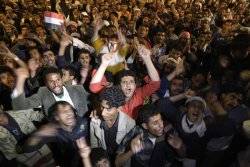Ali Abdullah Saleh, Yemen's outgoing president, has left for neighboring Oman on his way to the United States for medical treatment, Yemeni officials said.
The US state department said Saleh's request for a visa "has been approved".
"As we have indicated, the sole purpose of this travel is for medical treatment and we expect that he will stay for a limited time that corresponds to the duration of this treatment," it said in a statement on Sunday.
A Sanaa airport official said Saleh's plane took off in the evening.
The Yemeni news website Mareb Press quoted an unidentified source at the airport as saying Saleh left on a private Saudi plane a few hours after his family's departure.
"God willing, I will leave for treatment in the United States and I will return to Sanaa as head of the General People's Congress party," Saleh was quoted by the state news agency, SABA, as telling a meeting with party officials on Sunday.
"I ask for forgiveness from all my people, men and women, for any shortcomings during my 33-year-long rule," he said.
While an aide to Saleh said he would stay there in Oman for several days before heading to the US, an Omani official told the Reuters news agency that he would be in transit for only a few hours.
Diplomats in Sanaa said that Saleh's eldest son Ahmed - who commands the Republican Guard - was "already in Oman" to prepare for his father's arrival.
Sultan al-Barakani, a senior official of the GPC party, said last week that the 69-year-old president would visit Oman and then Ethiopia before travelling to New York for treatment for wounds he sustained in a bombing at the presidential palace last June.
'Execute the butcher
Meanwhile, tens of thousands of Yemenis staged protests against a law granting immunity for Saleh, from prosecution over a deadly crackdown on dissent.
The protesters carried banners during Sunday's rallies in Sanaa calling on parliament members to reverse their decision.
"It is our duty... to execute the butcher," chanted the protesters gathered in the Yemeni capital's Change Square, the center of the democracy movement that has been calling for Saleh's removal since January last year.
The demonstrators tried to march to the US embassy but were stopped by Yemeni security forces.
"To the lawmakers, we say there will be no immunity at the expense of the blood of our martyrs," the protesters said, referring to the hundreds killed in the government crackdown.
Saleh's immunity is part of a Gulf Co-operation Council-brokered power transition deal aimed at ending the unrest in the country.
Early presidential elections are scheduled to be held on February 21.
Yemen's parliament adopted the law on Saturday giving Saleh "complete" immunity from prosecution in return for stepping down.
Public outcry
Parliament also adopted a law approving Saleh's longtime deputy, vice-president Abd-Rabbu Mansour Hadi, as the consensus candidate in the election for Saleh's successor.
The law offers partial protection from legal action for Saleh's aides, saying they cannot face prosecution for "actions that were politically motivated and carried out in the exercise of their duties."
The final text of the immunity law specified the amnesty "does not apply to acts of terrorism", though no further details were revealed as to what actions may fall within that category.
The transitional government of national unity, which is led by the parliamentary opposition, had submitted eleventh-hour amendments on Friday reducing the scope of the amnesty offered to Saleh's aides following a public outcry.
The UN envoy to Yemen, Jamal Benomar, has criticized the immunity law, arguing that it neglects the rights of "victims".
Speaking before departing Yemen late on Saturday, Benomar said that though "the law was amended ... it does not live up to our expectations.
"The UN in principle stands against this type of blanket immunity."
Benomar further called on the Yemeni parliament to enact a "transitional justice and reconciliation" law that would allow victims to be heard and make claims for compensation.
He said the UN could not condone a broad amnesty that covers crimes against humanity, war crimes or gross violations of human right
PHOTO CAPTION
Protestors react after receiving the news of the departure of Yemen's President Ali Abdullah Saleh from Sanaa to Oman in Sanaa, Yemen, Jan. 22, 2012.
Aljazeera


 Home
Home Discover Islam
Discover Islam Quran Recitations
Quran Recitations Lectures
Lectures
 Fatwa
Fatwa Articles
Articles Fiqh
Fiqh E-Books
E-Books Boys & Girls
Boys & Girls  Articles
Articles










